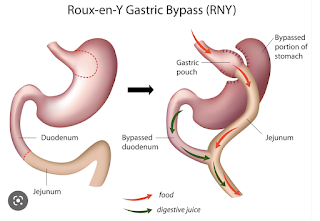bypassing the stomach,

banding the stomach,

or surgically reducing the size of the stomach

While this approach to weight reduction might improve the overall health and appearance of the patient, the authors of Prior Bariatric Surgery is Associated with an Increased Rate of Complications after Primary Shoulder Arthroplasty Independent of Body Mass Index sought to determine the effects of these procedures on the outcome of shoulder arthroplasty. They compared patients having primary shoulder arthroplasty (hemiarthroplasty, anatomic total shoulder, or reverse total shoulder) in patients with prior BS and a minimum of 2-year follow-up matched by age, sex, diagnosis, implant, American Society of Anesthesiologists score, Charlson Comorbidity Index, and surgical year to control groups with either body mass index (BMI) < 40 kg/m2 or ≥ 40 kg/m2.
They found that the bariatric surgery group had a higher rate of any complication, surgical complications, and non-infectious complications relative to both low and high BMI groups.
For BS patients, the 15-year survivorship free of any complication was 55.6% compared to 80.3% in the low BMI group and 75.8% in the high BMI group.

When shoulder arthroplasty was performed within 2 years of bariatric surgery, higher rates of complications, reoperations and revisions were observed.
For the bariatric group, the rate of medical complications was 5.5% in comparison to 3.3% for the non bariatric groups.
For the bariatric group, the rate of surgical complications was 25.1% in comparison to 12.6% for the non bariatric groups. Increased rates of rotator cuff and subscapularis failure, component loosening, and infections were seen in the bariatric group.
Interestingly, the authors of another study Bariatric Surgery Following Total Shoulder Arthroplasty Increases the Risk for Mechanical Complications Including Instability and Prosthetic Loosening found that bariatric surgery after shoulder arthroplasty was also associated with increased rates of complications.
Comment: The intent of bariatric surgery is to interfere with the absorption of nutrients from the gastrointestinal tract. This malabsorption can lead to vitamin and protein deficiency with resulting osteoporosis, compromised tendon health, and poor wound healing. Recognition of these risk factors may influence the decision to perform shoulder arthroplasty as well as the type of arthroplasty selected.
You can support cutting edge shoulder research that is leading to better care for patients with shoulder problems, click on this link.
Follow on twitter: https://twitter.com/shoulderarth
Follow on facebook: click on this link
Follow on facebook: https://www.facebook.com/frederick.matsen
Follow on LinkedIn: https://www.linkedin.com/in/rick-matsen-88b1a8133/
Here are some videos that are of shoulder interest
Shoulder arthritis - what you need to know (see this link).
How to x-ray the shoulder (see this link).
The ream and run procedure (see this link).
The total shoulder arthroplasty (see this link).
The cuff tear arthropathy arthroplasty (see this link).
The reverse total shoulder arthroplasty (see this link).
The smooth and move procedure for irreparable rotator cuff tears (see this link).
Shoulder rehabilitation exercises (see this link).

or surgically reducing the size of the stomach

While this approach to weight reduction might improve the overall health and appearance of the patient, the authors of Prior Bariatric Surgery is Associated with an Increased Rate of Complications after Primary Shoulder Arthroplasty Independent of Body Mass Index sought to determine the effects of these procedures on the outcome of shoulder arthroplasty. They compared patients having primary shoulder arthroplasty (hemiarthroplasty, anatomic total shoulder, or reverse total shoulder) in patients with prior BS and a minimum of 2-year follow-up matched by age, sex, diagnosis, implant, American Society of Anesthesiologists score, Charlson Comorbidity Index, and surgical year to control groups with either body mass index (BMI) < 40 kg/m2 or ≥ 40 kg/m2.
They found that the bariatric surgery group had a higher rate of any complication, surgical complications, and non-infectious complications relative to both low and high BMI groups.
For BS patients, the 15-year survivorship free of any complication was 55.6% compared to 80.3% in the low BMI group and 75.8% in the high BMI group.

When shoulder arthroplasty was performed within 2 years of bariatric surgery, higher rates of complications, reoperations and revisions were observed.
For the bariatric group, the rate of medical complications was 5.5% in comparison to 3.3% for the non bariatric groups.
For the bariatric group, the rate of surgical complications was 25.1% in comparison to 12.6% for the non bariatric groups. Increased rates of rotator cuff and subscapularis failure, component loosening, and infections were seen in the bariatric group.
Interestingly, the authors of another study Bariatric Surgery Following Total Shoulder Arthroplasty Increases the Risk for Mechanical Complications Including Instability and Prosthetic Loosening found that bariatric surgery after shoulder arthroplasty was also associated with increased rates of complications.
Comment: The intent of bariatric surgery is to interfere with the absorption of nutrients from the gastrointestinal tract. This malabsorption can lead to vitamin and protein deficiency with resulting osteoporosis, compromised tendon health, and poor wound healing. Recognition of these risk factors may influence the decision to perform shoulder arthroplasty as well as the type of arthroplasty selected.
Follow on twitter: https://twitter.com/shoulderarth
Follow on facebook: click on this link
Follow on facebook: https://www.facebook.com/frederick.matsen
Follow on LinkedIn: https://www.linkedin.com/in/rick-matsen-88b1a8133/
Here are some videos that are of shoulder interest
Shoulder arthritis - what you need to know (see this link).
How to x-ray the shoulder (see this link).
The ream and run procedure (see this link).
The total shoulder arthroplasty (see this link).
The cuff tear arthropathy arthroplasty (see this link).
The reverse total shoulder arthroplasty (see this link).
The smooth and move procedure for irreparable rotator cuff tears (see this link).
Shoulder rehabilitation exercises (see this link).